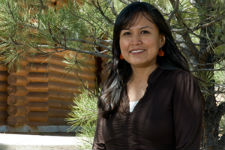Helping “Her People” as a Healer and Teacher

Regina Eddie
Assistant Clinical Professor, School of Nursing
1995 BS in Nursing 2006 MS Nursing
College of Health and Human Services
When it came time for Regina Eddie to move into a management position with Indian Health Services, she wasn’t sure she was ready. She had served on the Navajo reservation as a public health nurse for nearly half a decade, and a program director position had opened up. In an environment where staff was short, resources were thin, and the local population had great needs, Eddie faced a critical choice. Ultimately, she realized that it was up to her to make a difference.
“I realized, ‘Who else is going to do this? Who else is going to be an advocate for our own people?'” Eddie says. “I think that was a big realization for me: it was clear that I couldn’t walk away from an opportunity to help my people.”
For Eddie, who is originally from Pinon, Arizona, a small community on the Navajo reservation, accepting her new role ultimately played a large part in shaping her future career. A 1995 graduate of Northern Arizona University’s School of Nursing, Eddie would move on to the Master’s program following her tenure as a PHN program director for the Indian Health Services clinic. When she earned her M.S. degree in 2006, Eddie found herself in a position that, she says, was beyond her wildest dreams: she joined NAU as an assistant clinical professor in the School of Nursing. When that happened, she was in a position to become a different sort of advocate.
“I have a special interest and obligation to help my people back home, and in our Navajo communities,” says Eddie. “Especially with the Native American students that are coming in, I can make a difference culturally by being able to understand the challenges they face, and where they’re coming from. I can be there for them, and at the same time I can help raise awareness among all of my students.”
As a assistant clinical professor, Eddie is also the principal investigator for the American Indian Academic Success Program, which is funded by a grant through the John and Sophie Ottens Foundation and administered by the university’s College of Health and Human Services (CHHS). According to Eddie, the goal of the program, which launched in 2009, is to increase enrollment, retention, and graduation rates for Native American students in CHHS. The program provides a number of avenues of cultural, academic and social support for students, including faculty mentoring, peer tutoring, vouchers for childcare, food and transportation. Eddie says, however, that the support the program has received from CHHS leaders has been very important to helping the fledgling program.
“We started this past academic year with a traditional Navajo blessing ceremony on campus,” Eddie says. “We had 20-25 students and a number of faculty and college leaders attend. I was touched by how appreciative students were after the ceremony—for some this was a new experience to attend a blessing ceremony.”
In the classroom, Eddie also provides ways for her students to make a difference in the lives of the less fortunate. As part of their course work, Eddie sends her undergraduate students out into the field to help communities develop ways to cope with public health issues.
“I had a group last semester that was trying to find ways to address childhood obesity in a situation where there were few resources to do anything,” she says. “So they worked on developing a teaching plan for teachers to talk about healthier nutrition choices that children could make. Our focus, too, is to make sure that the project is sustainable for the community that (NAU students) are working with.”
In considering her career and the way she approaches her role as a teacher, Eddie says that lessons she learned while growing up in a strong Navajo family—she identifies her clans as being of the Ta’neeszahnii (Water Mist clan), born for Kiyaa’aanii (Towering House clan); her maternal grandfather’s as Tl’izi’lani (Manygoats clans), and paternal grandfather’s clan as the Todich’ii’nii (Bitter Water clan)—have been just as important as the training she received at NAU.
“Nothing I’ve accomplished would have been possible without the support and love of my family, including my children, husband, parents, and grandparents,” she says. “There’s a Navajo word, táá hó’jit’éégóó, that means ‘It’s up to you.’ Your path is determined by the choices you make.”
